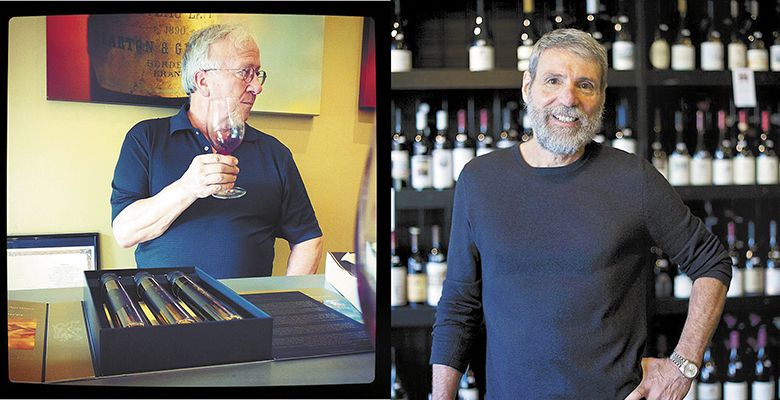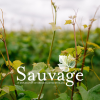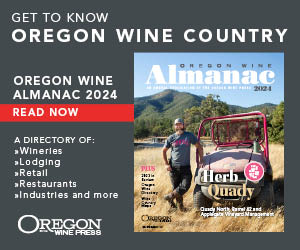Tell of Two Cities
California and Oregon retailers answer OWP
Clyde Beffa
K&L co-owner and main wine buyer Clyde Beffa owned a dairy in Tracy, California, from 1967–1973, leaving the the business to co-found K&L Liquors, as it was known back then, in 1976 in Milbrae, California. Beffa started traveling to Europe in 1982, and over the years, he has built K&L into one of the nation's most notable wine shops for world offerings.
How did you first become interested in wine?
I got married in January 1971. On our honeymoon, I read a Playboy Magazine article about wine collecting; it looked like fun, and I started collecting the next week.
Describe one of the best wines you’ve ever tasted.
[It was a] 1945 Chateau Latour [that I] drank at the Chateau three years ago. Ethereal nose of cassis and rose. Silky and seamless on the palate — all fruit in perfect harmony with the acid — no tannin. Finish that lasted over a minute.
What’s the most exciting retail trends over the last several years?
Young people are open minded and try different wines from all over the world.
What has 40 years of wine retail taught you about life?
It goes by too quickly! Like Woody Allen says; “If you stick around long enough people think you know what you are talking about.”
What is Oregon’s greatest asset in the wine world? What is its biggest challenge?
That is a loaded question, just like any question like this is. There is no way to identify one thing that makes them successful because there isn’t one thing. It’s always a combination of things. Place, maturing vineyards, collaboration between producers, focusing on a handful of successful varietals, history, vintage variation, sustainability, appropriate pricing in the marketplace, etc. All of these assets make them successful.
The challenge is just as complex. For us it is totally different than for retailers/restaurants in Oregon or even Washington. Competition is key. With all the great PN/CH/Ries coming from our own back yard, and elsewhere, why would customers here look at wines from OR. But if we weren’t here we’d have different problems like having true vintage variation, Lack of education/knowledge of the area, access to the great wines of the area.
Bob Scherb
Originally from New York, Bob Scherb is well known for his second career: owner of Liner & Elsen Wine Merchants in Northwest Portland. In 1998, he purchased the store from founders Bob Liner and Matt Elsen, who started it in 1990.
Liner & Elsen features a nationally recognized selection of fine wines, friendly and knowledgeable customer service, exclusive offerings and more.
How did you first become interested in wine?
I first became interested in wine when we still lived in New York and my wife and I started to travel abroad. One of our first trips that was wine-focused was to Burgundy, and since then Pinot Noir has been my first choice when buying and drinking wine. Soon thereafter, I joined a few tasting groups in New York and then became an avid student and collector. Pinot Noir was one of the reasons we moved to Oregon.
Describe one of the best wines you’ve ever tasted.
That is a tough question as I have had so many amazing opportunities come my way. However, recently, one of the finest wines I’ve had was a 1969 Joseph Drouhin Chambolle-Musigny Les Amoureuses. The wine was opened just a few years ago, and it still possessed freshness and brilliance, with tremendous nuance and subtlety. I find it hard to drink young wine. I like wines that have lost a good deal of their youthful fruit so they are able to transmit with better clarity the place they were born.
What’s the most exciting retail trends over the last several years?
Winemakers and growers in Oregon are experimenting with grapes other than Pinot Noir, and some are also looking back at the history of winemaking in other regions of the world and adopting some old-school thinking married to new technologies. Blending old and new approaches tells us a lot about how wines should be made and what they say about where the grapes were born.
What has a solid career in wine retail taught you about life?
To listen carefully. There’s always something to learn, and there are lots of folks who can teach you many things.
What is Oregon’s greatest asset in the wine world? What is its biggest challenge?
I think one of Oregon’s greatest assets is the willingness of the public to try new wines and experiences. There is a wonderful adventurous spirit that our customers demonstrate time and time again to engage to with things that are new. It seems to be a part of being an Oregonian. I also feel strongly that there are a lot of folks in the industry who take very seriously the impact of what they do with and to the land. If we want a sustainable industry, we will need to make decisions that preserve what we have.
I think the greatest challenge we face in Oregon (as well as other wine-growing regions) is to keep our viticulture as varied as possible and that we must pay a great deal of attention to how our land is treated and how we use the limited resources we have. People who make, sell and enjoy wine must take a close look at the choices we make. If we grow too large too quickly, many decisions will be made that will be detrimental to the wine industry as a whole — and to where we live. I firmly believe we need to think carefully before we allow our industry to be monopolized by people who want to put quantity before quality. That is especially true for the very largest retailers, who will purchase any kind of wine as long as they can control price, productivity and access. That kind of thinking invites poor land management, over production and the use of pesticides that no one needs.








